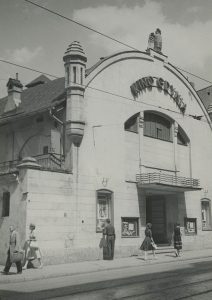Zweiter Teil der von Birte Förster und Hedwig Richter im Februar und März 2019 geposteten ...
Das Kino von Gdynia in der ul. Tuwima w Łodzi, I/4715/10. Fotograf: Ignacy Płażewski, Łódź, 1950er/1960er Jahre. Quelle: Wikimedia Commons / Lodz City Museum, Lizenz: CC BY-SA 3.0 PL
Leibniz-Institute for the History and Culture of Eastern Europe (GWZO) is now accepting submissions for the international academic workshop focusing on women’s cinema in the GDR and Poland from the end of the World War II in 1945 to the fall of the Berlin Wall in 1989. We invite proposals from researchers and practitioners working in the following fields: history and theory of film, television and other audiovisual media; production studies; film and literary genre theory; gender studies; queer theory; cultural studies; social studies; philosophy; history of Central and Eastern Europe.
The workshop aims to encourage reflection on the position of women in Polish and East German socialist film industries and film cultures.
[...]
